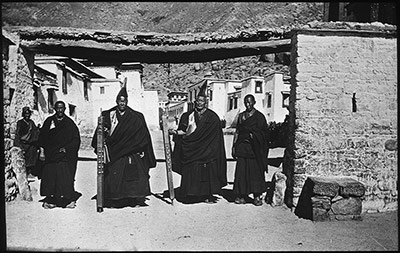
1998.286.172.2 (Lantern Slide)


1998.286.172.2 (Lantern Slide)

Sir Charles Bell
Sir Charles Bell
1922?
Lhasa Area > Sera
1998.286.172.2
81 x 81 mm
Lantern Slide
Donated 1983
St Antony's College, Oxford
Sir Charles Bell
Rosemeyer?
L.171
BL.P.340
British Library, Oriental and India Office Collections
Manual Catalogues - Bell's List of Illustrations entry: "[No. of chapter] XXXII [Subject of Chapter] The Religion [Subject of Illustration] Q280-157. The Shal-ngos at entrance of the Sera Monastery, with iron rods of office. [Where placed - book page [ G.J. [Remarks] L.171"
Technical Information - Although this image has been cross-referenced with P.340 (which is not in the PRM collection), the lantern slide seems to have been made by contact exposure against the negative for Q.280-157 and not by exposing the Postcard-sized image through an enlarger [MS 6/9/2004]
Other Information - Photographer: Because of the nature of re-photography that has taken place, the original image may have been taken by W. P. Rosemeyer during his trip to Lhasa in 1922 to extend the telegraph line and later forwarded to Bell (possibly via David Macdonald). Alternatively, this technique of re-photographing the print may simply have been a device that Bell used for making contact exposure lantern slides. However, the fact that the original print was made using a Postcard-sized negative suggests that this original photograph was not taken by Bell. Alternatively, it may have been taken by Lt Col Robert Kennedy, the Medical Officer on Bell's mission, who also used Postcard-sized negatives [MS 17/8/2004]
Contemporary Publication - Published in 'A Year in Lhasa' in The Geographical Journal, February,1924, facing p.96:"The Two Shengnos with Iron Rods of Office". This piece was derived from a lecture given to the Royal Geographical Society in London on 3rd December 1923 [MS 10/9/2004]
For Citation use:
The Tibet Album.
"Entrance to Sera Monastery"
05 Dec. 2006. The Pitt Rivers Museum.
<http://tibet.prm.ox.ac.uk/photo_1998.286.172.2.html>.
For more information about photographic usage or to order prints, please visit the The Pitt Rivers Museum.
© The Pitt Rivers Museum